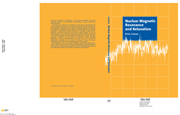Book contents
- Frontmatter
- Contents
- Preface
- 1 Introduction
- 2 Theoretical background
- 3 Detection methods
- 4 Classical view of relaxation
- 5 Quantum treatment of relaxation
- 6 Dipolar lineshape in solids
- 7 Relaxation in liquids
- 8 Some case studies
- 9 The density operator and applications
- 10 NMR imaging
- Appendix A Fourier analysis
- Appendix B Random functions
- Appendix C Interaction picture
- Appendix D Magnetic fields and canonical momentum
- Appendix E Alternative classical treatment of relaxation
- Appendix F Gm(t) for rotationally invariant systems
- Appendix G P(Ω, Ωo, t) for rotational diffusion
- Problems
- References
- Index
7 - Relaxation in liquids
Published online by Cambridge University Press: 02 December 2009
- Frontmatter
- Contents
- Preface
- 1 Introduction
- 2 Theoretical background
- 3 Detection methods
- 4 Classical view of relaxation
- 5 Quantum treatment of relaxation
- 6 Dipolar lineshape in solids
- 7 Relaxation in liquids
- 8 Some case studies
- 9 The density operator and applications
- 10 NMR imaging
- Appendix A Fourier analysis
- Appendix B Random functions
- Appendix C Interaction picture
- Appendix D Magnetic fields and canonical momentum
- Appendix E Alternative classical treatment of relaxation
- Appendix F Gm(t) for rotationally invariant systems
- Appendix G P(Ω, Ωo, t) for rotational diffusion
- Problems
- References
- Index
Summary
Transverse relaxation: moments
Relaxation in liquids
The previous chapter was devoted to a consideration of solid systems, where the spin magnetic moments were immobile, located at fixed positions. We examined the transverse relaxation which occurred in such cases and we saw that the relaxation profile could become quite complex. In the present chapter we turn our attention to fluid systems. Here the spins are moving and as a general rule the relaxation profile becomes much simpler. Our fundamental task will be to examine the effect of the particle motion upon the relaxation.
There is an important distinction, from the NMR point of view, between liquids and gases. In a gas the atoms or molecules spend the majority of their time moving freely, only relatively occasionally colliding with other particles. The atoms of a liquid, however, are constantly being buffeted by their neighbours. This distinction is relevant for relaxation mediated by interparticle interactions; clearly their effects will be much attenuated in gases. On the other hand, when considering relaxation resulting from interactions with an inhomogeneous external magnetic field, interparticle collisions are unimportant except insofar as they influence the diffusion coefficient of the fluid. However, since diffusion can be quite rapid in gases, some motional averaging of the inhomogeneity of the NMR magnet's Bo field can then occur. As a consequence, the usual spin-echo technique will no longer recover the transverse magnetisation lost due to the imperfect magnet.
In molecules there are two types of interparticle interaction which must be considered. Interactions between nuclear spins in the same molecule are averaged away relatively inefficiently by molecular motion.
- Type
- Chapter
- Information
- Nuclear Magnetic Resonance and Relaxation , pp. 207 - 253Publisher: Cambridge University PressPrint publication year: 1997
- 2
- Cited by



